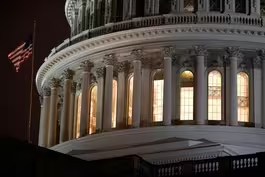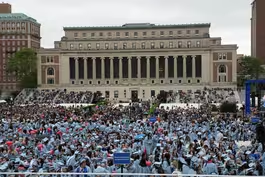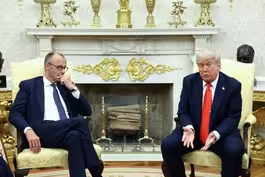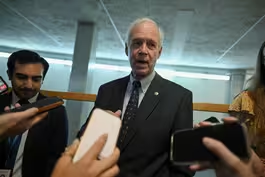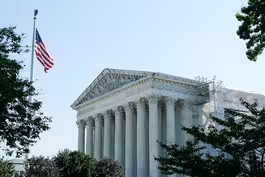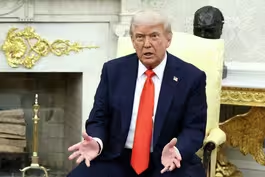
Explaining the national debt and how we got here
Clip: 6/5/2025 | 8m 3sVideo has Closed Captions
Explaining the national debt, how we got here and what it means for future generations
Republicans in Congress are hashing out a new tax cut and spending bill that's projected to add trillions to the national debt. Economics correspondent Paul Solman explains the ballooning national debt, how we got here and what it means for our economy and future generations.
Problems playing video? | Closed Captioning Feedback
Problems playing video? | Closed Captioning Feedback
Major corporate funding for the PBS News Hour is provided by BDO, BNSF, Consumer Cellular, American Cruise Lines, and Raymond James. Funding for the PBS NewsHour Weekend is provided by...

Explaining the national debt and how we got here
Clip: 6/5/2025 | 8m 3sVideo has Closed Captions
Republicans in Congress are hashing out a new tax cut and spending bill that's projected to add trillions to the national debt. Economics correspondent Paul Solman explains the ballooning national debt, how we got here and what it means for our economy and future generations.
Problems playing video? | Closed Captioning Feedback
How to Watch PBS News Hour
PBS News Hour is available to stream on pbs.org and the free PBS App, available on iPhone, Apple TV, Android TV, Android smartphones, Amazon Fire TV, Amazon Fire Tablet, Roku, Samsung Smart TV, and Vizio.
Providing Support for PBS.org
Learn Moreabout PBS online sponsorshipAMNA NAWAZ: Republicans in Congress are hashing## out a new tax cut and spending bill# that's projected to add trillions to## the national debt.
We will get to some# of those specifics in just a moment.
GEOFF BENNETT: But, first, let's take a step# back and explain a bit more about our already## ballooning national debt, how we got here and what# it means for our economy and future generations.
Here's economics correspondent Paul Solman.
PAUL SOLMAN: When we were there the other# day, the debt clock that's been in Manhattan## since 1989 said our country owed $35# trillion, $903 billion, $414 million.
The number's the total of every dollar the U.S.# government has borrowed to cover the difference## between what it spends and the revenue it# collects.
That collective debt has long## fueled anxiety about how it will burden future# generations.
Take this ad, which appeared on TV## a few years before the clock went up, time# so long ago that it's barely video-worthy.
ACTOR: You owe the United States# government in round numbers $50,000.
PAUL SOLMAN: The estimated projection for a# baby born today, four times as much.
Scary?
NATASHA SARIN, President, Budget Lab at# Yale University: The size and the sort of## trajectory of our fiscal path is making# a lot of people understandably nervous.
PAUL SOLMAN: To cover the gap between what# the government spends and what it collects,## we sell IOUs, call them bonds.
About a# fifth of our debt is held by different## parts of the government itself,# while the rest is held by the public,## which includes foreign governments,# investors and folks like you and me.
We rely on this debt to help fund the government.# In 2024, that included about $4 trillion on## benefit programs like Social Security, Medicare# and Medicaid, and nearly $2 trillion defense and## basically everything else.
In all, the U.S. spent# $1.8 trillion more than it took in, contributing## to a national debt that we have been building# on and off since the country's founding.
LIN-MANUEL MIRANDA, Actor: Welcome to the# present.
We're running the real nation.
PAUL SOLMAN: Before he was a Broadway# star, our first treasury secretary,## Alexander Hamilton, called the young# nation's debt the price of liberty and,## in the aftermath of the Revolutionary# War, advocated for the federal government## to take over state debts to cement# the colonies into the United States.
LIN-MANUEL MIRANDA: If we assume the debts,## the Union gets a new line of credit, a# financial diuretic.
How do y.. PAUL SOLMAN: The pace of borrowing has ebbed and# flowed with peaks due mostly to wartime spending,## though, generally, the borrowing# ebbed after a crisis was over.
But## in the aftermath of spending on the war# on poverty and Vietnam back in the 1970s,## spending again started to rise and hasn't stopped.
KENNETH ROGOFF, Economist, Harvard University:# Our debt relative to our income has doubled## in the last 20 years.
It has quadrupled# since 1980.
We borrow very promiscuously,## particularly during the financial# crisis and during the pandemic.
In fact, as things stand now,## we owe about as much as all the other# large advanced economies put together.
PAUL SOLMAN: But what's been happening lately?
NATASHA SARIN: Our society is becoming older,## and so more people are Social Security# beneficiaries and are getting their Social## Security checks.
And we haven't scaled up our# revenue collection in ways that match that.
PAUL SOLMAN: And there have also been tax cuts,## including during President Trump's# first administration in 2017.
DONALD TRUMP, President of the United States: It's# the largest tax cut in the history of our country.
PAUL SOLMAN: Those cuts cost about# $1.9 trillion over just a decade.
NATASHA SARIN: Tax reform, or cutting# taxes, cutting the revenues that we collect,## without raising commensurate revenue# to be able to cover the cost of that## lower tax burden, and the result is# we have every year higher deficits.
PAUL SOLMAN: So the yearly deficits pile up and# keep the total debt swelling?
But so what?
Today,## our debt is approaching levels not seen since# the end of World War II.
At least so far,## our economy sure hasn't collapsed.
Far from it.
KENNETH ROGOFF: If we have problems# -- we could have another pandemic.
We## could have a financial crisis.
God forbid# we could have a war of some type.
And we## will want to borrow a lot.
And the# fact our debt is starting so high,## it's a risk.
It gives us less flexibility# for dealing with these things.
PAUL SOLMAN: Economists say we have gotten a# pass because the dollar is the reserve currency,## meaning it's the most widely used currency in# the world.
But that dominance could be slipping.
KENNETH ROGOFF: Everybody sees, even if# we don't, that we are likely to have a## problem.
And it's not the end of the dollar.# It's not going to collapse.
But maybe they## want to be a little more diversified.# Maybe they want to do other things.
That further pushes up our interest rates.
That## makes it more painful.
And we're# in the thick of this right now.
PAUL SOLMAN: Look, our IOUs are not free.# We pay interest.
And the rate on it,## it's been rising.
In fact, interest is the# fastest growing part of the federal budget pie,## making up about 13 percent of spending in# 2024.
That's more than we spent on defense.## And the interest pie slice is more than# twice what it was just three years before.
NATASHA SARIN: It's not just that deficits are# going to rise and debt levels are going to be## higher.
What I actually worry about# is what it crowds out in the future,## because I think that's going to constrain you from# things like investing in future generations and## children in early childhood education or dealing# with the climate crisis that faces us today.
PAUL SOLMAN: But our debt hasn't# stopped investors from buying it.## And the idea that the U.S. would stop paying# entirely and default seems pretty unlikely.
On the other hand, defaults have happened# in other countries throughout history and## recently after the financial crisis.
NATASHA SARIN: We have seen sovereign## debt crises across Europe, where questions# about the viability of debt in countries like## Greece were raised, and the sort of drag on# those countries, not from just those moments,## but from what drawing into question your integrity# and your security and stability is a place to lend## really, what that means to the economy.# And these aren't short-lived impacts.
PAUL SOLMAN: In Greece, a budget crisis forced# the government to cut spending and raise taxes,## contracting the economy.
Unemployment# reached 27 percent in 2013.
It's a## crisis that took years for# the country to recover from.
So is the U.S. nearing the point# that it can't pay its debts?
KENNETH ROGOFF: We're not going to literally# tell them that we're not going to pay the debt,## but there's, of course, a threat of inflation,# the -- which makes the debt work less.
You get## paid back in dollars that don't buy as# much as when you lent them.
By the way,## that just happened with the excess inflation# that we had in the post-COVID years.
PAUL SOLMAN: And if our dollars are# worthless, the interest lenders would## demand to buy our new IOUs would go up, and the# more we'd have to borrow to pay the interest.
NATASHA SARIN: That interest rate won't just# be the interest rate that the government## owes people who lend to us.
It will also# trickle down to be the interest rate that## you have to pay on your mortgage or the interest# rate on your car loan or on your student debt.## And all of that matters to households# in a way that I suspect we're going## to start to feel and we're already really# feeling differently now than a decade ago.
PAUL SOLMAN: So the future of our# debt really matters.
And how much## debt we're about to add is being# determined in Congress right now.
For the "PBS News Hour," Paul Solman.
Afghan girl accepted to U.S. colleges faces uncertain future
Video has Closed Captions
Clip: 6/5/2025 | 3m 9s | Afghan girl accepted to U.S. colleges faces uncertain future after Trump's travel ban (3m 9s)
Breaking down Trump's 'Big Beautiful Bill' and its impact
Video has Closed Captions
Clip: 6/5/2025 | 4m 57s | Breaking down Trump's 'Big Beautiful Bill' and its impact on the deficit and national debt (4m 57s)
Commencement speakers share advice with the Class of 2025
Video has Closed Captions
Clip: 6/5/2025 | 4m 8s | Commencement speakers share advice with the Class of 2025 (4m 8s)
Germany's chancellor visits Trump as alliance is fracturing
Video has Closed Captions
Clip: 6/5/2025 | 4m 39s | Germany's chancellor visits Trump as Europe's alliance with U.S. is fracturing (4m 39s)
GOP Sen. Johnson on opposing Trump's budget in current form
Video has Closed Captions
Clip: 6/5/2025 | 5m 36s | GOP Sen. Ron Johnson explains why he opposes Trump's budget in its current form (5m 36s)
News Wrap: Mexico's suit against gun manufacturers blocked
Video has Closed Captions
Clip: 6/5/2025 | 5m 20s | News Wrap: Supreme Court blocks Mexico's $10 billion suit against U.S. gun manufacturers (5m 20s)
Trump defends his new travel ban as feud with Musk erupts
Video has Closed Captions
Clip: 6/5/2025 | 9m 4s | Trump defends his new travel ban as feud with Musk erupts (9m 4s)
Providing Support for PBS.org
Learn Moreabout PBS online sponsorshipSupport for PBS provided by:
Major corporate funding for the PBS News Hour is provided by BDO, BNSF, Consumer Cellular, American Cruise Lines, and Raymond James. Funding for the PBS NewsHour Weekend is provided by...

